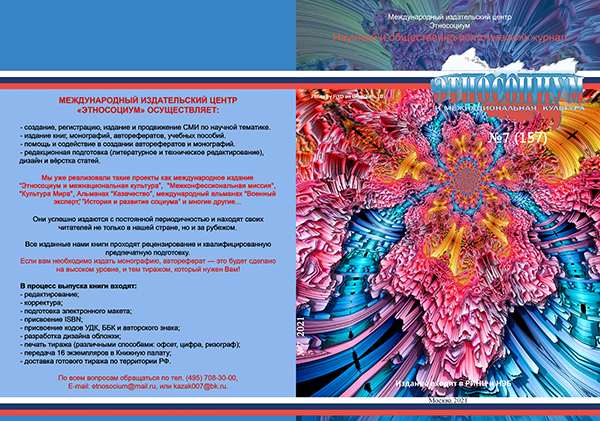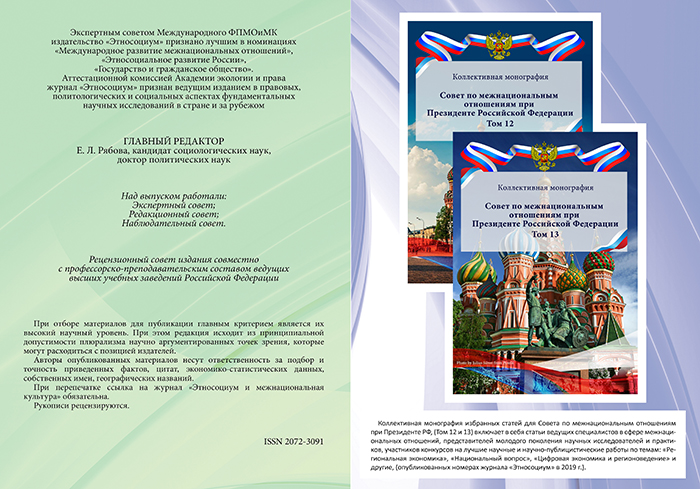

Content
|
ACTUAL PROBLEMS OF MODERN SOCIETY
|
|
|
Mikheev V.I. Types of modern media and features of their application in the pre-election period
|
9
|
|
Mikhailova A.V. Prevention of crimes in Russian society related to religious extremism and committed using telecommunications
|
15
|
|
INTERNATIONAL RELATIONSHIPS
|
|
|
Kazanin M.V. Abdrakhimov L.G. Military-political and military-technical support of PRC’s foreign economic projects
|
27
|
|
Kong Haiping The functions of non-governmental environmental organizations in building ecological civilizations in China (on the example of the organization "GREEN RIVER" of China)
|
38
|
|
Ostrovsky S.S. Political and legal aspects of the restoration of independence of the Baltic republics in the late 80s - early 90s in the context of the 30th anniversary of the collapse of the USSR
|
50
|
|
Trofimov V.A. Russian-Japanese territorial dispute: retrospective and perspective
|
65
|
|
Rovchak P.U. Problems in contemporary Russian-African relations
|
75
|
|
SOCIOLOGICAL SCIENCES
|
|
|
Konev I.V., Pitka S.N., Nadutkina I.E. Difficulties and problems of social governance of municipal projects
|
84
|
|
NEWS
|
|
|
Zorin V.Yu. Top management training programs in the Doctor of Public Administration format
|
94
|
|
REVIEW
|
|
|
Tkhorikov B.A. Russian administration
|
105
|
|
Abstracts
|
107
|
|
Authors
|
117
|
|
Requirements to materials submitted to the international publishing house "Etnosocium"
|
119
|
Relevance. The principles of freedom and justice laid down in the democratic structure of society provide an information space that creates conditions for free and democratic elections. Modern media actually create a social space and the political structure of society for the post-election period. The comparative analysis of modern media is actualized by a variety of decisions that should impartially and fairly ensure the expression of the will of society.
The object of the study. Modern media as a means of mass communication.
The subject of the study. Modern media as an integral element of the agitation mechanism in the political struggle.
The purpose of the study. It consists in detecting modern media and the peculiarities of their use in the pre-election period.
Research objectives. They consist in the study of authoritative generally recognized sources of the scientific nature of the subject area of the study; the use of formal and logical principles in conducting the study; a review of the literature on the subject area of the study; objectification of the conclusions of the study.
Research methodology. General logical methods were used, within the framework of a system-management approach, due to the system principles of the study.
The results of the study. They are expressed in the detection of modern media and the features of the phenomenon under consideration during the pre-election period.
Keywords: communication, defamation, expression of will, civil self-recognition, freedom of speech, democracy, political ethics.
This article considers the issues of the prevention of crimes in Russian society related to religious extremism and committed using information and telecommunication networks (including the internet) and analyzes the legislative changes and developments in this field of legal relations. Having analyzed the results in this field, the author offers a number of ways to prevent this type of crimes placing emphasis on the enhancement of preventive measures in the youth environment.
Keywords: Keywords: religious extremism, information and telecommunication network, Internet, crime, motive, destructive influence, society, State, prevention, youth environment.
The article presents the directions of military-political and military-technical support for the implementation of foreign economic projects of the PRC. Analysis of the forms and methods of interaction between the PLA and the Armed Forces of other states testifies to the PRC's adherence to the principles of "non-interference in internal affairs", "not creating military alliances" with a systemic expansion of its military presence aimed at solving economic problems.
Keywords: strategic project «One belt, one road», military-political and military-technical cooperation, PLA, military industry, joint logistic support station.
In recent years, with the development of the Chinese economy, the ecological environment has been polluted and the ecological balance has been disturbed. Protecting the environment is urgent. Non-governmental environmental organizations are playing an increasingly important role among the various actors in environmental pollution control. This article analyses various environmental activities and projects carried out by the non-governmental environmental organization “GREEN RIVER” since its establishment and discusses its functions in building an ecological civilization. The environmental non-governmental organization GREEN RIVER has made an important contribution to building an ecological civilization and is an important force in promoting the protection in China.
Keywords: non-governmental environmental organization, ecological civilization, environmental protection, functions, "GREEN RIVER".
The article examines the circumstances of the restoration of the independence of the Lithuanian, Latvian and Estonian Republics in the late 80s - early 90s of the XX century, which influenced the further fate of the Soviet Union. The influence of the peculiarities of the Soviet legal system on these events is analyzed (in the context of the consolidation at the legislative level of issues related to the change in the territorial integrity of the Union of Soviet Socialist Republics through the secession of the union republics from it), the processes of the so-called. "Perestroika" (in particular, the revival of national identity due to the democratization of Soviet society) and the results of the All-Union referendum on the preservation of the USSR on March 17, 1991. The social and political processes on the territory of the Baltic Union republics, the content of acts and declarations adopted by the Supreme Councils of the Lithuanian, Latvian and Estonian SSR regarding the proclamation of state independence, as well as the reaction to this on the part of the union leadership are considered. It emphasizes the importance of changing the position of Soviet diplomacy regarding the signing of a secret protocol to the Non-Aggression Pact between Germany and the Soviet Union of August 23, 1939, and how the Supreme Councils of the Lithuanian, Latvian and Estonian SSR used this circumstance to justify their right to restore independence.
Keywords: USSR, republic, Baltic states, leadership, union, legislation, economy, republic.
The article provides a comprehensive study of the historical aspect of the territorial problem between Japan and Russia, an analysis of the state of scientific elaboration of the problem of the Russian-Japanese territorial dispute in the context of modern political ones. Legal and economic processes.
Keywords: geopolitics, international relations, historical regional studies, territorial dispute, Asia-Pacific region, Kuril Islands, South Sakhalin.
Africa is rapidly transforming, and the opportunities that are opening up are attracting heightened interest from the international community. External partners seek to actively strengthen diplomatic, defense and trade ties with the continent. Russia is also interested in developing relations with all countries of the continent. To identify the prospects for interaction with African countries, it is now necessary to identify the existing problems. After the collapse of the Soviet Union, Africa, in fact, found itself on the periphery of Russia's interests. And today Russia still has a relatively weak competitive position in most areas of Russian-African cooperation. The complex geopolitical agenda remains a significant obstacle to the development of relations between Russia and African countries. Russia lags far behind other international actors in the economic, humanitarian and information spheres. The problem also lies in the different vision of the prospects, connected, among other things, with the informational disorientation of the media in both directions. Russia does not fully take into account the internal political peculiarities of African countries, and is not always able to pay due attention to interaction with civil society and representatives of the entire political spectrum.
Keywords: Russian-African relations, prospects, problems, politics, economics, education, mass media, digital technologies, humanitarian sphere.
The article presents the results of a random sociological survey of employees of three municipal districts of the Belgorod region - Belgorodsky, Rakityansky and Yakovlevsky. In the process of project management, certain problems may arise, the timely recognition and resolution of which becomes an important prerequisite for improving management activities. These problems are expressed in violation of technological requirements, complication and "bureaucracy" of organizational structures, insufficient resource provision, inadequate leadership style, staff shortage and possible positional conflicts, insufficient level of motivation, inadequate perception of project goals, status uncertainty of participants project activities.
Keywords: project management, municipal project, management, municipal employee, project activity, resource provision, motivation, problem.
The article gives a brief overview of the events and speeches of the speakers on the second day of the conference.
Keywords: speaker, discussion, program, sociology, personnel, development, politics, state, national politics.
The development of the Russian economy is inconceivable without the formation of a national school of management, which uses its own methodological apparatus and understands national peculiarities that latently and clearly affect management processes.
Keywords: professions, skills, specialist, training, students.